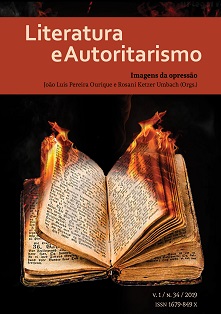The First War in Hans Herbert Grimm's picaresque novel Schlump
DOI:
https://doi.org/10.5902/1679849X37168Keywords:
First World War, picaresque novel, Book BurningAbstract
Schlump (1928) narrates the adventures of a soldier during the First World War. Despite its massive divulgation, Schlump had a poor reception at its time. In the year 1933, the work was forbiddenand burned by the Nazis. After decades of oblivion, in 2008, the literary reviewer Volker Weidermann published a book about the Book Burning, which started a process of recuperation of the work, giving it a new chance, as it was published for the second time in the 100th anniversary of the First World War. The reception to Schlump was very positive and showed a clear desire of the critics to compensate for what happened during the Nazi regime. A careful lecture of the book, however, reveals an attitude that tends to being more frivolous than pacifist, and a narrative that is unable to deliver the critical look thatwas promised by its recent positive reviews, as it will be presented in this article.
Downloads
References
BRECHT, Bertolt. “Schweyk im Zweiten Weltkrieg.” In: BRECHT, Bertolt. Stücke 5. Frankfurt am Main: Suhrkamp Verlag, 1967, p. 1913-1997.
GRIMM, Hans Herbert. Schlump. Köln: Kiepenheuer & Witsch, 2014.
GRIMMELSHAUSEN, Hans Jacob Christoffel. O aventuroso Simplicissimus. Trad.: Mario Luiz Frungillo. Curitiba: Ed. UFPR, 2008.
HAŠEK, Jaroslav. As aventuras do bom soldado Švejk. Trad.: Luís Carlos Cabral. Rio de Janeiro: Objetiva, 2014.
HORN, Eva. “Erlebnis und Trauma. Die narrative Konstruktion des Ereignisses in Psychiatrie und Kriegsroman.” In: MÜLDER-BACH, Inka. Modernität und Trauma. Wien: WUV, 2000, p. 131-162.
KÜRTEN, Jochen. “Schlump: Eine literarische Wiederentdeckung.” Deutsche Welle Online. 24 de junho de 2014 https://www.dw.com/de/schlump-eine-literarische-wiederentdeckung/a-17729754 Acesso em 29/01/2019.
JACOBS, Jürgen. Der deutsche Schelmenroman. Eine Einführung. München; Zürich: Artemis Verlag, 1983.
JACOBS, Jürgen. “Schelmenroman.” In: MÜLLER, Jan-Dirk (org.) Reallexikon der deutschen Literaturwissenschaft. Band III. P-Z. Berlin; New York: Walter de Gruyter, 2007, p. 371-374.
LIU, Max. “Schlump by Hans Herbert Grimm, book review”. The Independent. 16 de abril de 2015. https://www.independent.co.uk/arts-entertainment/books/reviews/schlump-by-hans-herbert-grimm-book-review-10181522.html Acesso em 29/01/2019.
RÜHMKORF, Peter. “Nach dem Soergel der Serke. Kein Wiedergutmachungs-, sondern ein Wiederentdeckungsbuch.” Die Zeit. 10 de fevereiro de 1978 https://www.zeit.de/1978/07/nach-dem-soergel-der-serke Acesso em 18/01/2019.
SCHIMMANG, Jochen. “Nicht nur Dumme kommen in die Schützengräben”. Frankfurter Allgemeine Zeitung. 25 de abril de 2014. https://www.faz.net/aktuell/feuilleton/buecher/nicht-nur-dumme-kommen-in-die-schuetzengraeben-hans-herrmann-grimm-grosser-weltkriegsroman-schlump-12910285.html Acesso em 29/01/2019.
WEIDERMANN, Volker. “Nachwort.” In: GRIMM, Hans Herbert. Schlump. Köln: Kiepenheuer & Witsch, 2014, p. 335-348.
WEIDERMANN, Volker. Das Buch der verbrannten Bücher. Köln: Kiepenheuer & Witsch, 2008.
Downloads
Published
How to Cite
Issue
Section
License
DECLARAÇÃO DE ORIGINALIDADE E EXCLUSIVIDADE E CESSÃO DE DIREITOS AUTORAIS
Declaro que o presente artigo é original e não foi submetido à publicação em qualquer outro periódico nacional ou internacional, quer seja em parte ou na íntegra. Declaro, ainda, que após publicado pela Literatura e Autoritarismo, ele jamais será submetido a outro periódico. Também tenho ciência que a submissão dos originais à Literatura e Autoritarismo implica transferência dos direitos autorais da publicação digital. A não observância desse compromisso submeterá o infrator a sanções e penas previstas na Lei de Proteção de Direitos Autorais (nº 9610, de 19/02/98).






